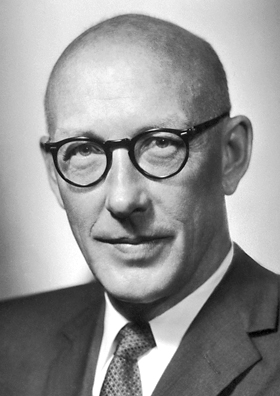Edward Tatum facts for kids
Quick facts for kids
Edward Tatum
|
|
|---|---|
 |
|
| Born | December 14, 1909 |
| Died | November 5, 1975 (aged 65) |
| Alma mater | University of Chicago University of Wisconsin–Madison |
| Known for | Gene regulation of biochemical events within cells |
| Awards | Nobel Prize in Physiology or Medicine |
| Scientific career | |
| Fields | Genetics |
| Institutions | Stanford University Yale University Rockefeller Institute |
Edward Lawrie Tatum (December 14, 1909 – November 5, 1975) was an American scientist. He was a geneticist, which means he studied genes and how they pass on traits.
In 1958, he won half of the Nobel Prize in Physiology or Medicine. He shared it with George Beadle. They showed that genes control important steps inside living cells. The other half of the prize went to Joshua Lederberg.
Contents
Edward Tatum's Big Discoveries
Edward Tatum helped us understand how genes work. His research changed how we think about biology.
Genes and Enzymes
Tatum and George Beadle did important experiments. They used a type of bread mold called Neurospora crassa. They exposed the mold to X-rays. This caused small changes in the mold's genes, called mutations.
They found that these mutations changed specific enzymes. Enzymes are like tiny helpers that make chemical reactions happen in cells. Their work showed that each gene usually controls one specific enzyme. This idea is known as the "one gene, one enzyme" hypothesis. It was a huge step in understanding how our bodies work.
Genes in Bacteria
After his work with mold, Tatum started studying bacteria. With his student, Joshua Lederberg, he made another big discovery. They showed that Escherichia coli (a common type of bacteria) could share genetic information.
This sharing happens through a process called recombination. It means bacteria can swap parts of their genes. This was important because it showed that bacteria are not just simple cells. They can also mix and match their genetic material.
About Edward Tatum
Edward Tatum was born in Boulder, Colorado. He loved science from a young age.
He went to college at the University of Chicago. Later, he earned his PhD in biochemistry from the University of Wisconsin–Madison in 1934. Biochemistry is the study of the chemistry of living things.
In 1937, he started working at Stanford University. This is where he began his famous work with George Beadle. He then moved to Yale University in 1945. There, he guided Joshua Lederberg, who would also become a Nobel Prize winner.
Tatum returned to Stanford in 1948. In 1957, he joined the Rockefeller Institute in New York City. He passed away in New York City in 1975.
- Nobel Lectures, Physiology or Medicine 1942-1962, Elsevier Publishing Company, Amsterdam, 1964
- Biographical Memoirs: National Academy of Sciences, Volume 59, National Academy Press, 1990
See also
 In Spanish: Edward Lawrie Tatum para niños
In Spanish: Edward Lawrie Tatum para niños

